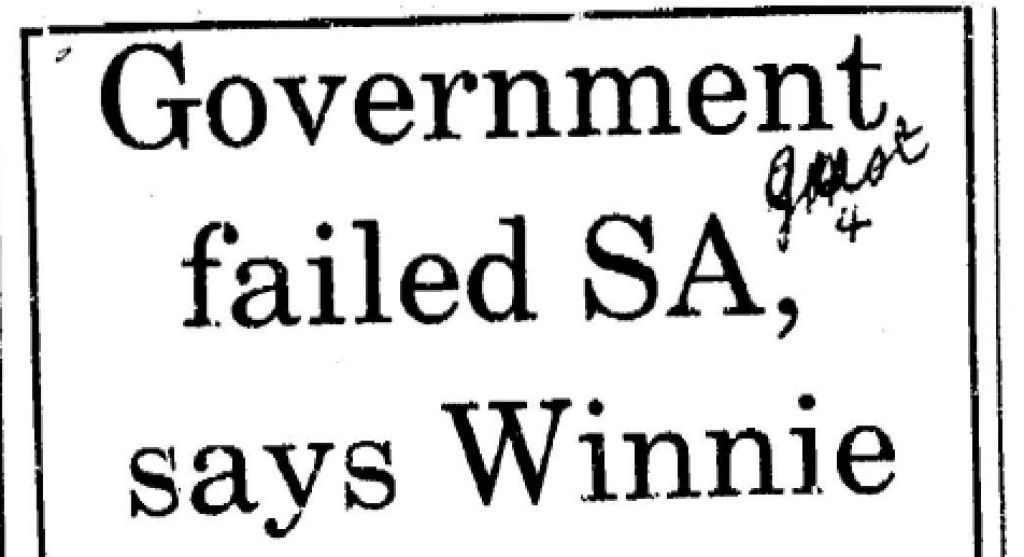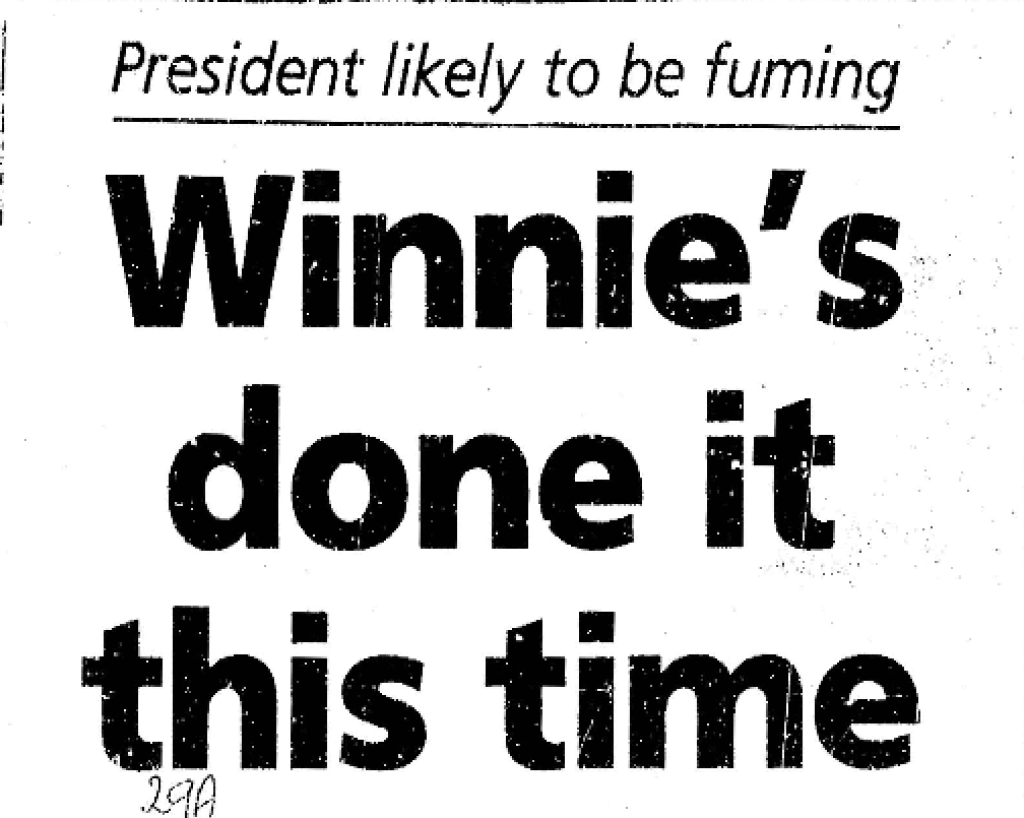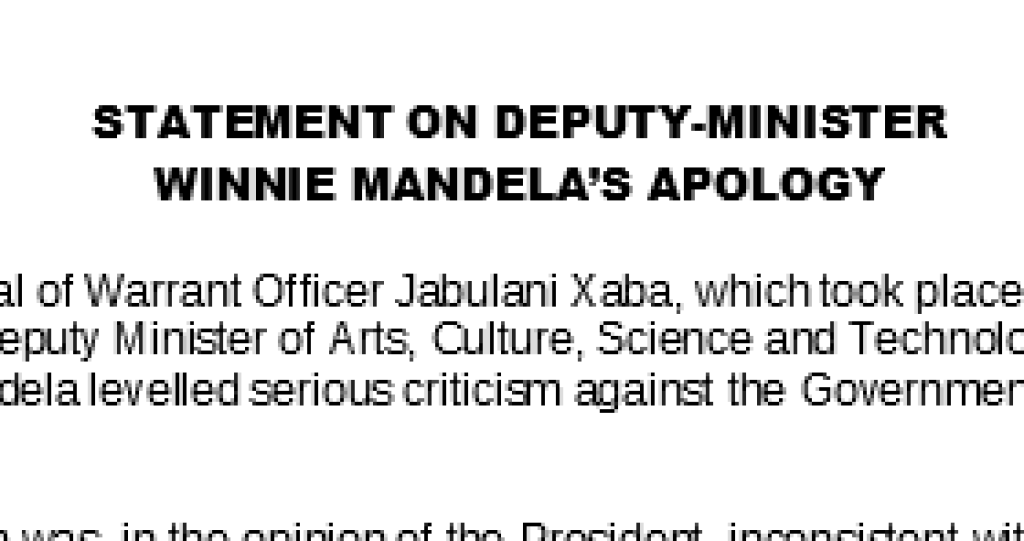Angered by the circumstances in which a black Soweto policemen was shot dead in February 1995 by white police colleagues, Deputy Minister Winnie Madikizela-Mandela made a statement at his funeral which drew the first of a series of actions by the president that culminated in her dismissal from the Cabinet. For Nelson Mandela, the action he took was amongst the most emotionally difficult – it meant taking action against someone for whom, though estranged, he felt love and who had given him an anchor of support during the years in prison; whose role in the struggle he admired and who had strong support in the ANC.
When black police-officers in Soweto went on strike to protest at racism they were experiencing within the service, the station commander called in the Internal Stability Unit. A tape of radio communications after the engagement which resulted in Warrant Officer Xaba’s death recorded open racism. At his funeral Winnie Madikizela-Mandela was reported as saying that government had failed people such as Warrant Officer Xaba because it had not removed racism from the work place, and that it was time to address people’s expectations that apartheid imbalances would be addressed.222
Nelson Mandela took exception to the statement that the government had failed people and a week later, after consulting with ministers, deputy ministers and senior ANC officials, a statement was issued.

At the funeral of Warrant Officer Jabulani Xaba, which took place early last week, the Deputy Minister of Arts, Culture, Science and Technology, Mrs Winnie Mandela levelled serious criticism against the Government of National Unity.
The criticism was, in the opinion of the President, inconsistent with her position as a member of the government. In keeping with his constitutional responsibilities as head of Government, President Nelson Mandela called on the Deputy Minister to publicly retract her statement and apologise to the Government.
Accordingly, the President received a letter from the Deputy Minister last night, 13 February 1995, in which the Deputy Minister complied.
The President has accepted the apology.
Ministers and Deputy Ministers are custodians of the policy of the government of the day. Their acceptance of positions in Government obliges them not only to help formulate policy in relevant fora, but also to implement to the letter the decisions of the government.
A month later there was another statement, this time announcing her dismissal after consultations within the ANC nationally and in the provinces. In the background, though not mentioned in the statement, was further criticism of the government, and a visit to West Africa by the deputy minister that had not been authorised by the president, as was required by executive protocol. As a statement by the president’s office explained: ‘it often happens that ministers and deputy ministers depart on official visits abroad prior to the correspondence with the president's office having been formally finalised. In this particular- case, Deputy President Thabo Mbeki, acting on behalf of the President, had advised the deputy minister not to undertake the trip to West Africa. The deputy minister subsequently wrote to the president explaining why it was Important to proceed with the trip. The deputy minister departed, as scheduled, before the consultation on her resubmitted request could be completed.’224
The announcement of dismissal was brief.

As President of the Republic, Head of the Government of National Unity and leader of the ANC, I have relieved Nomzamo Winnie Mandela of her position as Deputy Minister of Arts, Culture, Science and Technology.
This decision has been taken both in the interest of good government and to ensure the highest standards of discipline among leading officials in the Government of National Unity.
I have taken this decision after much reflection, given that Comrade Winnie Mandela has, in the past, played an important role in the struggle against apartheid, both in her individual capacity and as a leading member of the ANC and the rest of the democratic movement.
I hope that this action will help the former Deputy Minister to review, and seek to improve on, her own conduct in positions of responsibility, so as to enable her to make the positive contribution to society, which her talents would enable her.
But the dismissal was challenged on procedural grounds. The constitution required that such a decision by the president should be taken after consultation with the two deputy presidents and leaders of all the parties in the Cabinet. Wanting to avoid leaks, the president delayed the consultation as long as possible. When at the last minute he wanted to consult Buthelezi, he could not contact him and so consulted a senior member of the IFP. Although advised that the consultation met the legal requirements, Mandela decided that ‘the dismissal of Mrs Mandela should be treated as technically and procedurally invalid.’ He did so out of commitment ‘to act within the spirit of the Constitution and, further ... to spare the government and the nation the uncertainties which might follow protracted litigation on this issue.’226
When the president returned from his foreign visit, the deputy minister was dismissed for the second time, and finally – with correct procedures having been strictly followed.

The dismissal was to take effect on 18 April – on the day before that, Winnie Mandela called a media conference and announced her resignation.228

The President owes it to me as a citizen of this country in my capacity as Deputy Minister


